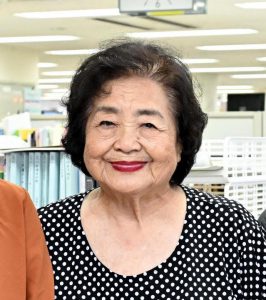Nihon Hidankyo upon receiving Nobel Peace Prize: Setsuko Thurlow moved by speeches at Nobel Peace Prize award ceremony, thinking about A-bomb victims
Dec. 12, 2024
by Yumi Kanazaki, Staff Writer
Setsuko Thurlow, 92, an atomic bomb survivor living in Canada, watched the Nobel Peace Prize award ceremony online from her home on December 10. She previously delivered a speech at the 2017 award ceremony when the International Campaign to Abolish Nuclear Weapons (ICAN) received the Nobel Peace Prize. The Chugoku Shimbun asked her about her thoughts on this event.
Seven years ago, as I stood on stage, my thoughts were with the atomic bomb victims who could no longer speak for themselves. This time, Terumi Tanaka, co-chair of the Japan Confederation of A- and H- Bombs Sufferers Organizations (Nihon Hidankyo), talked about his personal experience of losing his relatives and recounted the organizations’ history during his speech. He repeatedly said, “The Japanese government has done nothing to compensate for the dead.” Hearing this moved me, and tears welled up in my eyes.
A-bomb survivors have called for the abolition of nuclear weapons, carrying the unfulfilled hope of those who died. It is the nation that starts a war and forces people to endure the suffering caused by the A-bombing. I admire him for going back to the roots of this issue and addressing the nation’s responsibility to its citizens.
Jorgen Watne Frydnes, Chair of the Nobel Committee, also delivered a speech that deeply moved me. His recognition of the longtime dedication of A-bomb survivors made me feel all our efforts were appreciated. When he directly called out nuclear weapon states like the United States and Russia by name and said, “More countries must ratify the Treaty on the Prohibition of Nuclear Weapons (TPNW),” I felt encouraged. Norway is a member of the North Atlantic Treaty Organization (NATO), the nuclear alliance. His statement did not take the Norwegian government’s position into consideration.
Mr. Tanaka’s speech resonated with Mr. Frydnes’, enhancing their overall persuasiveness. I believe their speeches at the award ceremony will reach surprisingly many people worldwide.
Seven years ago, government representatives who criticized the TPNW, including those from the U.S. and the U.K., refused to attend the award ceremony, leaving me at a loss for words. The TPNW entered into force in 2021, but the high-handed attitude of nuclear weapon states and the reliance on nuclear force by allied countries has become more pronounced. I hope the young generation that passes down the experiences of the A-bombing will urge their governments to take action. In particular, the A-bombed country that has turned its back on the TPNW is called into question.
(Originally published on December 12, 2024)
Setsuko Thurlow, 92, an atomic bomb survivor living in Canada, watched the Nobel Peace Prize award ceremony online from her home on December 10. She previously delivered a speech at the 2017 award ceremony when the International Campaign to Abolish Nuclear Weapons (ICAN) received the Nobel Peace Prize. The Chugoku Shimbun asked her about her thoughts on this event.
Seven years ago, as I stood on stage, my thoughts were with the atomic bomb victims who could no longer speak for themselves. This time, Terumi Tanaka, co-chair of the Japan Confederation of A- and H- Bombs Sufferers Organizations (Nihon Hidankyo), talked about his personal experience of losing his relatives and recounted the organizations’ history during his speech. He repeatedly said, “The Japanese government has done nothing to compensate for the dead.” Hearing this moved me, and tears welled up in my eyes.
A-bomb survivors have called for the abolition of nuclear weapons, carrying the unfulfilled hope of those who died. It is the nation that starts a war and forces people to endure the suffering caused by the A-bombing. I admire him for going back to the roots of this issue and addressing the nation’s responsibility to its citizens.
Jorgen Watne Frydnes, Chair of the Nobel Committee, also delivered a speech that deeply moved me. His recognition of the longtime dedication of A-bomb survivors made me feel all our efforts were appreciated. When he directly called out nuclear weapon states like the United States and Russia by name and said, “More countries must ratify the Treaty on the Prohibition of Nuclear Weapons (TPNW),” I felt encouraged. Norway is a member of the North Atlantic Treaty Organization (NATO), the nuclear alliance. His statement did not take the Norwegian government’s position into consideration.
Mr. Tanaka’s speech resonated with Mr. Frydnes’, enhancing their overall persuasiveness. I believe their speeches at the award ceremony will reach surprisingly many people worldwide.
Seven years ago, government representatives who criticized the TPNW, including those from the U.S. and the U.K., refused to attend the award ceremony, leaving me at a loss for words. The TPNW entered into force in 2021, but the high-handed attitude of nuclear weapon states and the reliance on nuclear force by allied countries has become more pronounced. I hope the young generation that passes down the experiences of the A-bombing will urge their governments to take action. In particular, the A-bombed country that has turned its back on the TPNW is called into question.
(Originally published on December 12, 2024)








